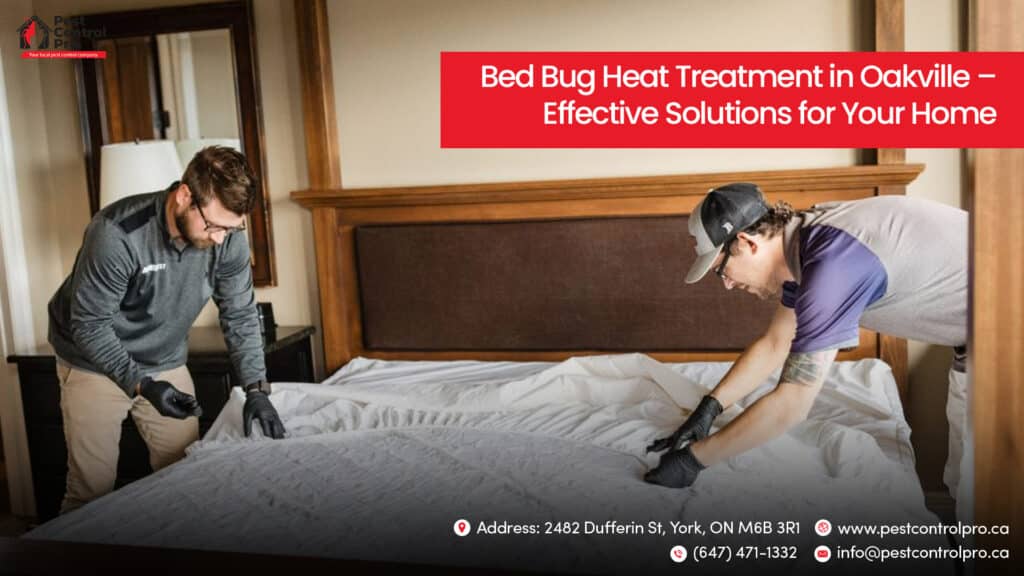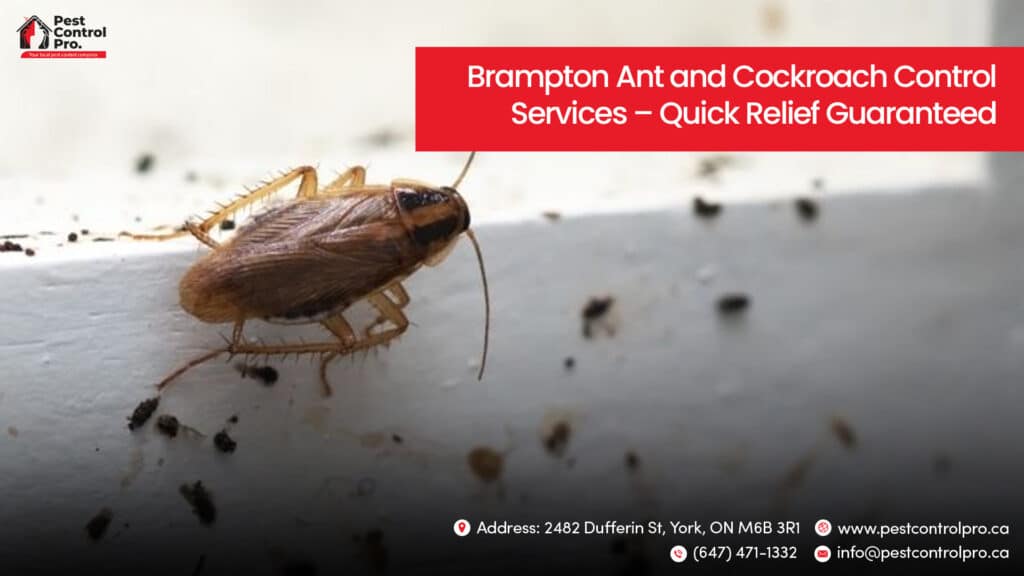Pest control in Toronto condos is crucial for maintaining a healthy living space. High-rise buildings often have shared walls and limited barriers, making it easy for pests like bed bugs and cockroaches to invade. These pests can slip in through tiny cracks, so early detection is key.
To keep your home safe, schedule regular inspections and engage with your neighbors. Community involvement can significantly reduce pest issues. Did you know that bed bugs can survive for several months without a meal? This fact underscores the importance of proactive measures.
By implementing effective pest management strategies and utilizing professional services, you can ensure your condo remains a pest-free haven. Together, we can protect our homes and create a healthier environment for everyone.
Importance of Pest Control in Toronto Condos
Pest control is essential for Toronto condo living. In multi-unit buildings, pests like cockroaches and bed bugs thrive due to shared walls and close quarters.
These pests can cause serious health issues and damage to your property. Regular inspections and proactive pest management are key to keeping your home safe.
By engaging professional pest control services, you ensure a secure environment for yourself and your neighbors.
Did you know that a single female bed bug can lay up to 500 eggs in her lifetime? This makes early detection crucial to preventing infestations.
Staying vigilant and implementing effective pest control measures not only protects your living space but also enhances your overall quality of life.
How Pests Enter High-Rise Buildings
Pests enter high-rise buildings through various entry points. Cracks and gaps in the exterior walls offer easy access for rodents and insects. Common entry points include doors, windows, exterior vents, and utility lines. Pests exploit these areas for shelter and food.
You might unknowingly carry pests into your condo via personal items, packages, or clothing. Shared spaces like hallways and laundry rooms increase the risk of pest movement between units, making pest control challenging.
To protect your home, identify and seal these entry points. Regular maintenance and vigilant inspections can help prevent infestations.
Did you know that a single female cockroach can produce up to 30,000 offspring in a year? By staying proactive, you can avoid turning your building into a pest haven. Taking these steps will lead to effective pest management solutions and a healthier living environment.
Health Risks Associated With Pest Infestations
Pest infestations in your Toronto condo can lead to serious health risks. Pests like rodents, cockroaches, and bed bugs not only disrupt your daily life but also pose significant threats to your health.
Rodents, such as mice and rats, can contaminate your food. This increases the risk of foodborne illnesses. They leave droppings and urine on surfaces, making your living space unsanitary.
Cockroaches are notorious for producing allergens that can trigger allergies and respiratory issues. If you live in a multi-unit building, these pests can easily spread, exacerbating asthma and breathing difficulties for you and your neighbors.
Bed bugs are more than just a nuisance. They disrupt your sleep and can lead to anxiety due to their rapid reproduction. The psychological distress they cause can affect your overall well-being.
| Pest Type | Health Risk | Impact |
|---|---|---|
| Rodents | Foodborne illnesses | Contaminated surfaces |
| Cockroaches | Allergies, respiratory issues | Asthma exacerbation |
| Bed Bugs | Sleep disruption, anxiety | Psychological distress |
Did you know that a single female bed bug can lay up to 500 eggs in her lifetime? That’s why it’s crucial to address these infestations promptly. Maintaining a healthy living environment is essential for your well-being, so don’t hesitate to seek professional pest control services to protect your home.
Effective Pest Control Strategies for Condominiums
To effectively manage pest infestations in your Toronto condominium, you need to embrace proactive strategies that prioritize prevention and early action. Integrated Pest Management (IPM) is your best ally in this endeavor. This approach involves conducting regular inspections—ideally two to four times a year—and implementing customized treatments to tackle specific pest issues.
Start by sealing potential entry points, such as cracks around your windows and doors. This simple step can significantly lower the chances of pests sneaking in. Additionally, keeping common areas clean helps eliminate food sources that attract unwanted critters, strengthening your pest prevention efforts.
If you notice any signs of pests, report them promptly. Quick reporting allows property management to intervene before the problem escalates, which is crucial in multi-unit complexes where infestations can spread rapidly.
Collaborating with pest control experts will keep you ahead of the game, ensuring your home remains a comfortable and safe space free from intruders.
Did you know that a single cockroach can produce up to 30,000 offspring in a year? Taking action now can prevent a small issue from turning into a major infestation down the line.
The Role of Professional Pest Control Services
When dealing with pest problems in your Toronto condominium, trust professional pest control services. These specialists focus on high-density living, providing customized solutions for various pest issues.
They employ Integrated Pest Management (IPM) strategies, which emphasize prevention, monitoring, and eco-friendly treatments to ensure your safety.
Regular inspections and proactive treatment plans are crucial since pests can easily travel between units, resulting in widespread infestations. Pest control teams are skilled in managing complex infestations that stem from shared spaces, all while adhering to local health regulations.
Did you know that a single cockroach can produce up to 400 offspring in its lifetime?
With ongoing monitoring and maintenance, professional pest control helps you maintain a pest-free environment, greatly enhancing your comfort and well-being as a condo resident.
Tips for Residents to Prevent Pest Issues
Preventing pest issues in your Toronto condo can be straightforward if you follow some key steps.
First, maintain cleanliness, particularly in your kitchen. Regularly clean surfaces and dispose of food waste promptly to remove potential food sources for pests.
Next, seal any cracks or gaps in your walls, windows, and doors. This will block entry points where pests, like ants or cockroaches, might sneak in.
If you notice any signs of pest activity, such as droppings or unusual smells, report them immediately to your property management. Quick reporting helps ensure timely intervention and can prevent a small issue from becoming a full-blown infestation.
Also, avoid using cardboard boxes for storage. They can attract pests like silverfish or mice. Instead, opt for plastic bins.
Finally, conduct regular inspections in high-risk areas, such as kitchens and bathrooms, to catch early signs of trouble.
Did you know that a single female German cockroach can produce up to 400 offspring in her lifetime? Keeping your living space tidy and inspecting regularly can help you stay ahead of such pests.
Additional Services Offered by Pest Control Providers
As a resident of a Toronto condo, it’s crucial to keep your living space clean and pest-free. However, don’t overlook the extra services that pest control providers offer, which can significantly enhance your home environment.
Many pest control companies, like Orkin and Terminix, provide comprehensive pest management plans. These plans often include regular inspections and follow-up treatments, ensuring that you enjoy a long-term pest-free space. If you face an urgent pest issue, a 24-Hour Response Guarantee can be a lifesaver, giving you peace of mind.
Moreover, you may want to consider eco-friendly pest control solutions. These not only help reduce pest attraction but also promote a healthier living space for you and your family.
Don’t forget about washroom care products, which are designed to deter pests from those areas.
Additionally, scent services can transform your community into a more inviting atmosphere, making it a pleasant place to live. Condo boards and property managers can also benefit from specialized services, such as SHARPs waste disposal, which ensures safe handling and disposal of hazardous materials.
Did you know that regular pest control can reduce the risk of allergies and asthma in your home? By taking advantage of these additional services, you can create a safer and more enjoyable living environment for yourself and your neighbors.
Frequently Asked Questions
Who Is the Responsibility of the Pest Control in a Condo?
Pest control in a condo is a shared responsibility. The landlord manages pest control policies, ensuring a pest-free environment. As a tenant, you play a vital role in pest prevention. This includes following guidelines and participating in maintenance schedules.
Think of it this way: your landlord provides the tools, while you help keep the toolbox organized. For example, if you notice signs of pests, it’s crucial to report them immediately. This teamwork helps prevent infestations.
Did you know that rodents can reproduce rapidly, with a single pair producing up to 200 offspring in a year? That’s why prompt action is essential. By staying proactive and communicating with your landlord, you contribute to a healthier living space for everyone. Remember, effective pest control requires both your efforts and those of your landlord.
What Is the Hardest Pest to Get Rid Of?
When it comes to the hardest pest to eliminate, bed bugs are at the top of the list. These tiny, elusive insects are notorious for their resilience and ability to multiply quickly. Following closely are termites, which can silently cause significant structural damage to homes. Cockroaches and rodents also pose considerable challenges due to their adaptability and quick reproduction rates.
Did you know that bed bugs can survive for several months without feeding? This makes them particularly tough to eradicate. Effective pest control requires tailored strategies and often the expertise of professionals who understand these pests’ behaviors.
If you’re facing a pest problem, it’s crucial to seek specialized treatment. Remember, early intervention is key to prevention and successful removal.
How Much Does Pest Control Cost Toronto?
Pest control costs in Toronto can vary based on several factors, including the type of pest, the size of the infestation, and the specific service provider you choose. Typically, you might expect to spend anywhere from $100 to $300 for a standard treatment. For larger infestations or specialized services, the costs can rise significantly.
When considering pest control pricing, keep in mind that condo maintenance expenses differ greatly. Effective pest management services are essential for high-rise buildings, where tenant responsibilities can complicate pest issues. For instance, bed bugs in a shared building may require a coordinated effort among tenants to ensure complete eradication.
Did you know that Toronto has over 1,000 pest control companies? This wide range gives you options but also means you should do your research to find reputable services that offer tailored solutions for your specific pest problem.
As a pest control professional, I always recommend preventive measures. Regular inspections and maintenance can save you money in the long run by addressing issues before they escalate. Whether you’re dealing with ants, rodents, or other pests, knowing your options can help you make informed decisions.
Can I Refuse Pest Control in My Apartment in Ontario?
In Ontario, you cannot refuse pest control in your apartment. As a tenant, you have a responsibility to maintain a safe living environment. Your landlord must follow health regulations and condo rules that require pest management. Ignoring these policies can lead to serious consequences, including potential legal issues.
Did you know that pests like cockroaches can trigger asthma in some individuals? This highlights the importance of addressing pest problems quickly. So, when pest control is offered, it’s in your best interest to cooperate for your health and comfort. As a Pest Control Pro, I recommend keeping communication open with your landlord about any pest issues you encounter.



